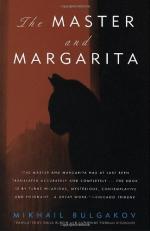|
This section contains 1,999 words (approx. 5 pages at 400 words per page) |

|
McIntosh-Byrd is a doctoral candidate at the University of Pennsylvania. In the following essay she looks at Mikhail Bulgakov's The Master and Margarita as a commentary on the nature and politics of writing.
Mikhail Bulgakov's The Master and Margarita is a novel about novelsan argument for the ability of literature to transcend both time and oppression, and for the heroic nature of the writer's struggle to create that literature. The story's hero, the Master, is an iconographic representation of such writers. Despite rejection, mockery and self-censorship, he creates a fictional world so powerful that it has the ability to invade and restructure the reality of those that surround him. Indeed, it has a life beyond authorial control. Despite his attempts to burn it, the story of Pontius Pilate refuses to die. As Woland remarks, "Manuscripts don't burn." This transcendence of message over physical formthe eternal...
|
This section contains 1,999 words (approx. 5 pages at 400 words per page) |

|




